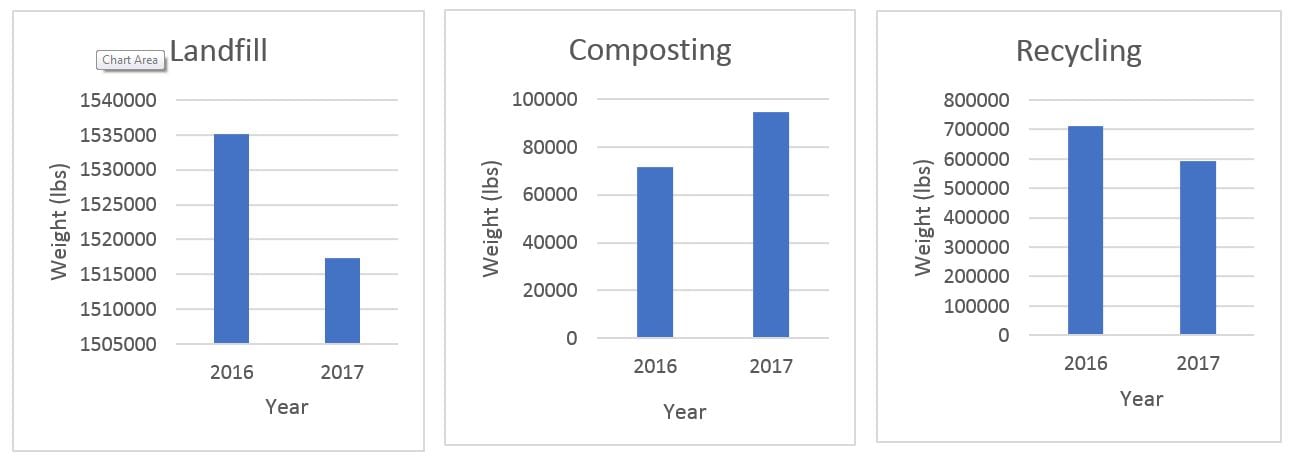RecycleMania is an eight-week period in which schools across the country report waste diversion data for three waste streams: landfill, recycle and food organics, and are then ranked in a variety of competitions. The information is compiled and compared to determine each school’s relative standing on per capita waste generation and the overall waste diversion percentage.
Historically, WashU’s participation in the competition has helped us better understand our strengths and potential areas of improvement, informing waste diversion policies and outreach strategies. Last year, when WashU went from ranking 9 out of 232 to 110 out of 208, the university undertook significant outreach efforts to analyze and address the situation.
As in past years, the Office of Sustainability worked with recycling and organics haulers to measure and report data weekly over the eight week competition. Monitoring and analyzing the data during the competition period has proven to be very interesting.
By the Numbers:
- Compost collection increased by a staggering 22,768 lbs. (positive!)
- The percentage of rejected compost loads dropped to 10% from almost 40% (positive!)
- Recycling materials fell from 712,400 lbs. to 591,500 lbs. (negative)
- Percentage of rejected recycling loads dropped to 1.6% from 23% (positive!)
- Landfill waste was reduced by 17,800 lbs. (positive!)
- Overall waste was reduced by 115,875 lbs. (positive!)
When considered in aggregate, this data paints an optimistic picture. Recycling volume and weight was reduced because the university community got the message to sort waste more carefully: to go boxes and other common disposables are not recyclable. As a result, recycling went down and composting went up. In addition, we believe that both the custodial and dining staff were more aware of contamination issues and kept bags with high levels of non-recyclable materials out of the recycling dumpsters, decreasing the number of rejected loads. Our interpretation of the data is that the university community learned and adapted to the new information circulated through the educational campaign.
Despite progress, one other data point has proven to be discouraging: the diversion rate. Because recycling decreased more significantly then compost increased and landfill decreased, the overall result is a lower diversion rate. The campus-wide goal is a 55% diversion rate by 2020. To get to the goal, we will have to make sure more of the items in our waste stream are either recyclable or compostable and continue to emphasize the importance of recycling and composting as much waste as possible (correctly).
Rankings
This year, Washington University ranked 109 of 190 schools in the diversion category, and 38 of 245 in the Per Capita Classic Category, which measures the recycling generated per person. Although our ranking in the latter category fell from 22 of 269 last year, our per capita composting significantly rose from 2.713 pounds per capita to 3.52 pounds per capita, pulling up our ranking from 91 out of 140 to 79 out of 134. Strong performance in electronics recycling resulted in a bump in the electronics recycling category; an increase in per capita electronics recycled led to us ranking 7 of 39 this year (up from 9 out of 50). The university recycled 38,000 pounds of electronics through normal collection avenues, in addition to a special e-recycling event on campus.

